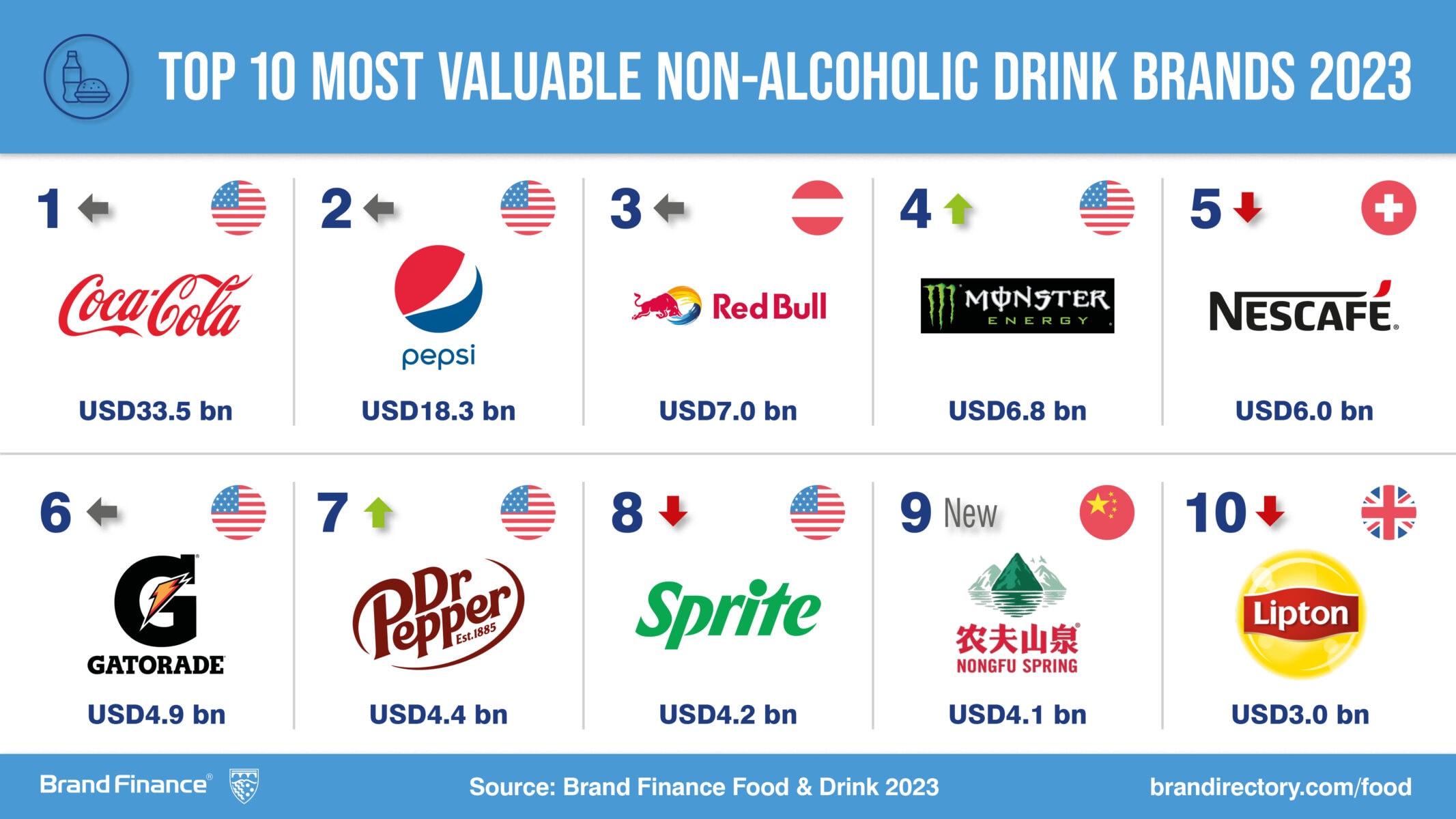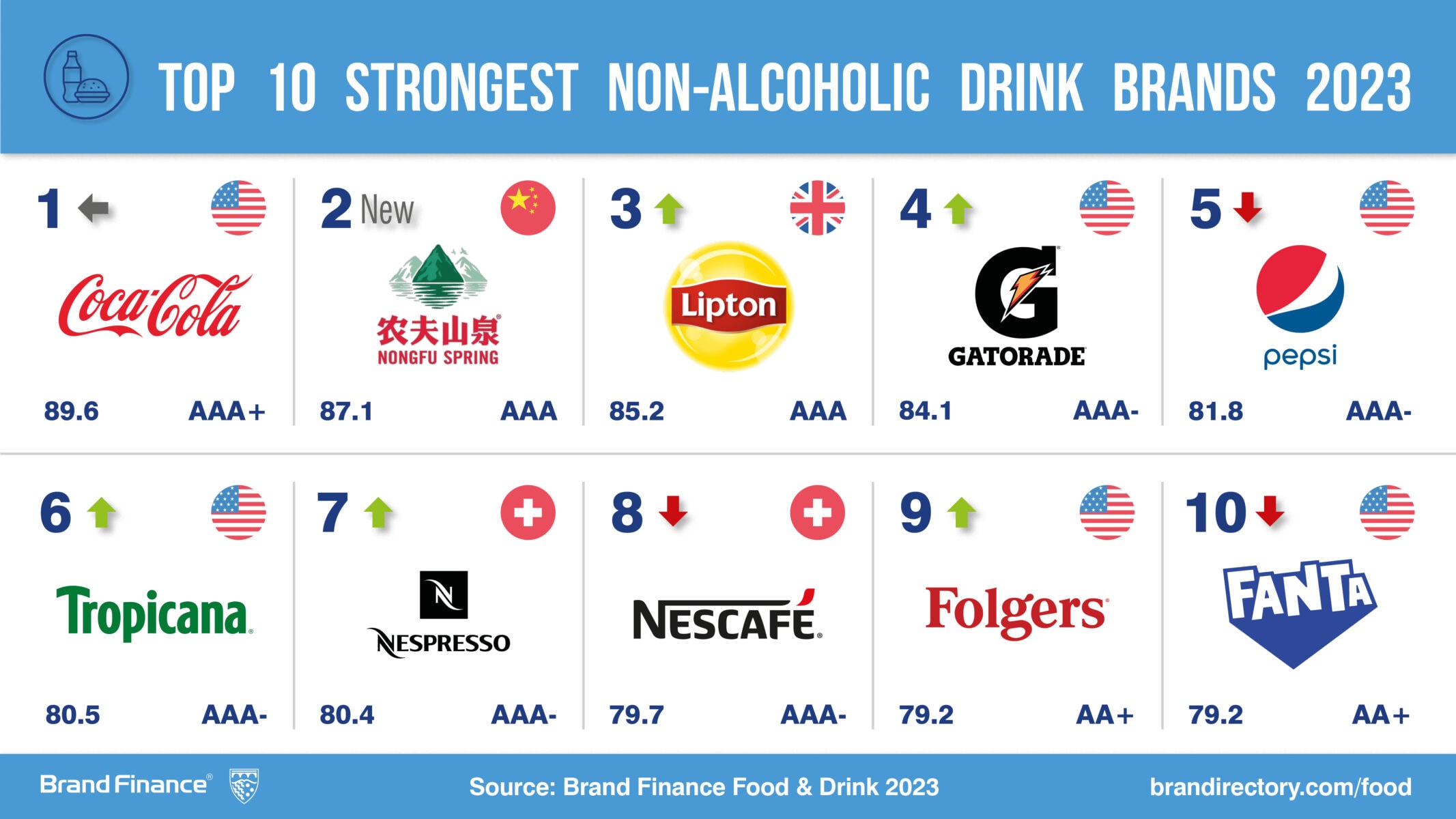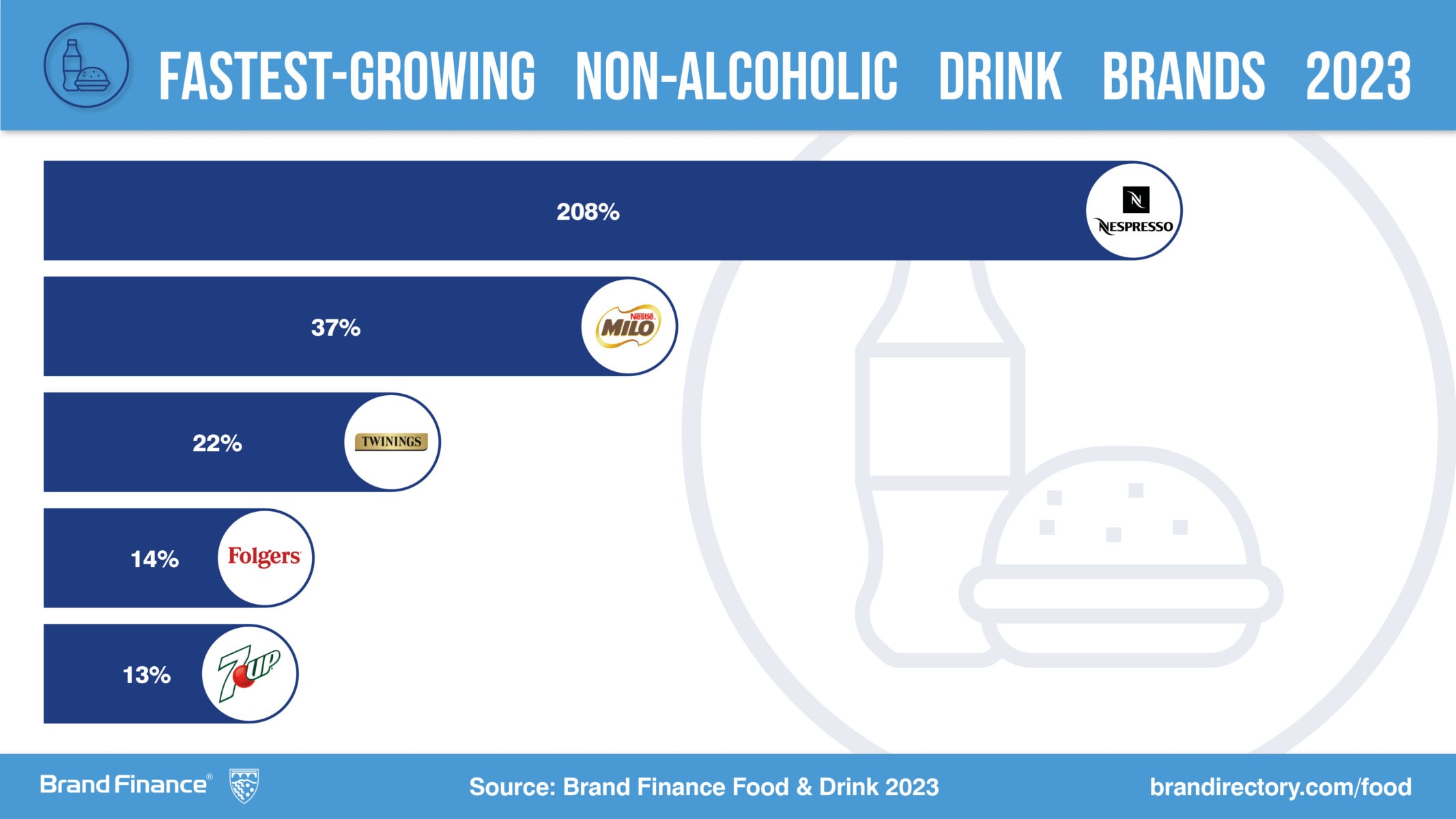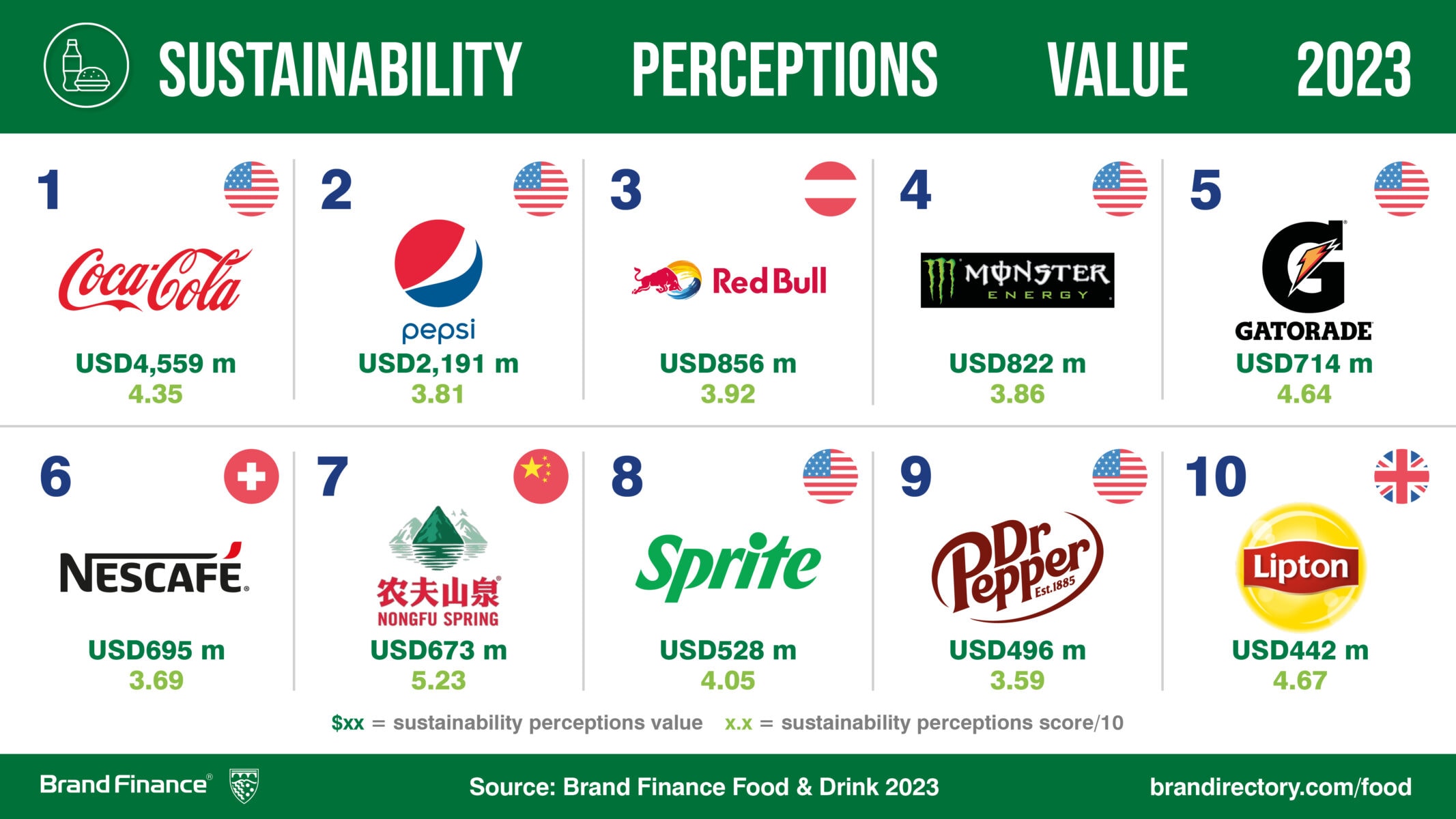View the full Brand Finance Food 100 2023 report here
Coca-Cola sips success as world’s most valuable and strongest non-alcoholic drinks brand, valued at USD33.5 billion
Coca-Cola (brand value down 5% to USD33.5 billion) retains its title as the world’s most valuable non-alcoholic drinks brand, according to a new report from leading brand valuation consultancy, Brand Finance.
Every year, leading brand valuation consultancy Brand Finance puts 5,000 of the biggest brands to the test, and publishes over 100 reports, ranking brands across all sectors and countries. The world’s top 25 most valuable and strongest non-alcoholic drinks brands are included in the annual Brand Finance Non-Alcoholic Drinks 25 2023 ranking.
Coca-Cola’s (brand value down 5% to USD33.5 billion) enduring brand value can be largely attributed to its global familiarity and reputation, bolstered by innovative product developments, large-scale marketing campaigns, and digital engagement. Ahead of the FIFA World Cup in 2022, the brand launched its ‘Believing in Magic’ campaign, aiming to celebrate the shared passion and connection experienced by football fans and foster deeper consumer relationships. The brand also launched its digital engagement platform, the Coca-Cola Fan Zone. Approximately 5 million fans connected with the hub that was activated in 41 markets, further boosting the brand’s international exposure and prestige.
Savio D'Souza, Valuation Director at Brand Finance, commented:
“With a rich history, iconic brand story, and a steadfast dedication to customer experience and satisfaction, Coca-Cola has remained a global leader. The brand continues to boost its international reputation and capture the loyalty of generations across the globe through ingenious and powerful marketing campaigns, product evolutions and innovative digital strategies.”

In addition to calculating brand value, Brand Finance also determines the relative strength of brands through a balanced scorecard of metrics evaluating marketing investment, stakeholder equity, and business performance. Compliant with ISO 20671, Brand Finance’s assessment of stakeholder equity incorporates original market research data from over 100,000 respondents in 38 countries and across 31 sectors.
Coca-Cola also maintains its position as the world's strongest non-alcoholic drinks brand, with an AAA+ rating and a Brand Strength Index (BSI) score of 89.6/100. The giant continues to enjoy immense global recognition and popularity. Its iconic brand narrative, logo, and memorable marketing campaigns, aimed at connecting with consumers on an emotional level and evoking nostalgic sentiments, have become deeply ingrained in popular culture and have fostered customer loyalty across the globe.

Energy drink brands hold onto top 10 ranks
Red Bull (brand value up 1% to USD7 billion) Monster (brand value up 8% to USD6.8 billion) and Gatorade (brand value down 7% to USD4.9 billion) maintain their top 10 ranks this year, with Red Bull ranking as the third-most valuable non-alcoholic drinks brand. Energy drink consumption has continued to rise since the pandemic, with both adults and teens seeking energy drinks as convenient options to fuel busy and active lifestyles. Red Bull remains one of the world’s most recognisable drinks brands, with a unique brand identity, catchy slogan, and enormous global presence fuelled by its various sporting endorsements and sponsorships.
Nespresso is the fastest-growing non-alcoholic drinks brand
Nespresso’s (brand value up 208% to USD2.9 billion) brand value has increased enormously since the pandemic, when home coffee consumption surged as customers sought a premium experience at home. With its emphasis on quality and luxury, Nespresso became a popular choice. The brand has continued to boost its premium perceptions and global reputation with its innovative range of coffee machine and capsule offerings, as well as its sustainability initiatives, winning an award in 2022 for its innovation efforts in promoting fairtrade coffee.

Coca-Cola has the highest Sustainability Perceptions Value, valued at USD4.6 billion
As part of its analysis, Brand Finance assesses the role that specific brand attributes play in driving overall brand value. One such attribute, growing rapidly in its significance, is sustainability. Brand Finance assesses how sustainable specific brands are perceived to be, represented by a ‘Sustainability Perceptions Score’. The value that is linked to sustainability perceptions, the ‘Sustainability Perceptions Value’, is then calculated for each brand.
Coca-Cola has the highest Sustainability Perceptions Value (SPV) at USD4.6 billion. It should be noted that the brand’s position at the top of the SPV table is not an assessment of its overall sustainability performance, but rather indicates how much brand value it has tied up in sustainability perceptions. That said, Coca-Cola promotes an ambitious sustainability agenda, aiming to make 100% of its packaging recyclable globally by 2025 and use at least 50% recycled material by 2030. The company also aims to implement sustainable solutions throughout its value chain, aiming to reduce greenhouse gas emissions by 25% by 2030 and achieve net-zero carbon emissions by 2050.

Brand Finance is the world’s leading brand valuation consultancy. Bridging the gap between marketing and finance, Brand Finance evaluates the strength of brands and quantifies their financial value to help organisations make strategic decisions.
Headquartered in London, Brand Finance operates in over 25 countries. Every year, Brand Finance conducts more than 6,000 brand valuations, supported by original market research, and publishes over 100 reports which rank brands across all sectors and countries.
Brand Finance also operates the Global Brand Equity Monitor, conducting original market research annually on 6,000 brands, surveying more than 175,000 respondents across 41 countries and 31 industry sectors. By combining perceptual data from the Global Brand Equity Monitor with data from its valuation database — the largest brand value database in the world — Brand Finance equips ambitious brand leaders with the data, analytics, and the strategic guidance they need to enhance brand and business value.
In addition to calculating brand value, Brand Finance also determines the relative strength of brands through a balanced scorecard of metrics, compliant with ISO 20671.
Brand Finance is a regulated accountancy firm and a committed leader in the standardisation of the brand valuation industry. Brand Finance was the first to be certified by independent auditors as compliant with both ISO 10668 and ISO 20671 and has received the official endorsement of the Marketing Accountability Standards Board (MASB) in the United States.
Brand is defined as a marketing-related intangible asset including, but not limited to, names, terms, signs, symbols, logos, and designs, intended to identify goods, services, or entities, creating distinctive images and associations in the minds of stakeholders, thereby generating economic benefits.
Brand strength is the efficacy of a brand’s performance on intangible measures relative to its competitors. Brand Finance evaluates brand strength in a process compliant with ISO 20671, looking at Marketing Investment, Stakeholder Equity, and the impact of those on Business Performance. The data used is derived from Brand Finance’s proprietary market research programme and from publicly available sources.
Each brand is assigned a Brand Strength Index (BSI) score out of 100, which feeds into the brand value calculation. Based on the score, each brand is assigned a corresponding Brand Rating up to AAA+ in a format similar to a credit rating.
Brand Finance calculates the values of brands in its rankings using the Royalty Relief approach – a brand valuation method compliant with the industry standards set in ISO 10668. It involves estimating the likely future revenues that are attributable to a brand by calculating a royalty rate that would be charged for its use, to arrive at a ‘brand value’ understood as a net economic benefit that a brand owner would achieve by licensing the brand in the open market.
The steps in this process are as follows:
1 Calculate brand strength using a balanced scorecard of metrics assessing Marketing Investment, Stakeholder Equity, and Business Performance. Brand strength is expressed as a Brand Strength Index (BSI) score on a scale of 0 to 100.
2 Determine royalty range for each industry, reflecting the importance of brand to purchasing decisions. In luxury, the maximum percentage is high, while in extractive industry, where goods are often commoditised, it is lower. This is done by reviewing comparable licensing agreements sourced from Brand Finance’s extensive database.
3 Calculate royalty rate. The BSI score is applied to the royalty range to arrive at a royalty rate. For example, if the royalty range in a sector is 0-5% and a brand has a BSI score of 80 out of 100, then an appropriate royalty rate for the use of this brand in the given sector will be 4%.
4 Determine brand-specific revenues by estimating a proportion of parent company revenues attributable to a brand.
5 Determine forecast revenues using a function of historic revenues, equity analyst forecasts, and economic growth rates.
6 Apply the royalty rate to the forecast revenues to derive brand revenues.
7 Discount post-tax brand revenues to a net present value which equals the brand value.
Brand Finance has produced this study with an independent and unbiased analysis. The values derived and opinions presented in this study are based on publicly available information and certain assumptions that Brand Finance used where such data was deficient or unclear. Brand Finance accepts no responsibility and will not be liable in the event that the publicly available information relied upon is subsequently found to be inaccurate. The opinions and financial analysis expressed in the study are not to be construed as providing investment or business advice. Brand Finance does not intend the study to be relied upon for any reason and excludes all liability to any body, government, or organisation.
The data presented in this study form part of Brand Finance's proprietary database, are provided for the benefit of the media, and are not to be used in part or in full for any commercial or technical purpose without written permission from Brand Finance.